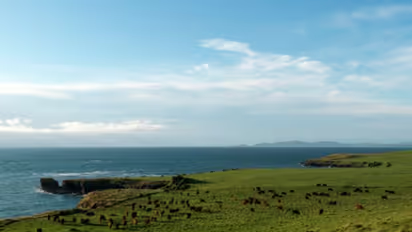Breathe easy! Exploring Cape Grim, the place with the cleanest air on Earth

Synopsis
The article discusses Cape Grim, a remote Tasmanian peninsula known for having the cleanest air on Earth, amid global concerns about air pollution and climate change.
In recent years, the search for clean air on Earth has become an urgent global endeavour. With the growing awareness of the devastating impacts of air pollution and climate change, the importance of clean, breathable air for all living beings is increasingly recognized. Among the places that stand out for offering the cleanest air to visitors is Cape Grim, a remote peninsula near the north-western tip of Tasmania, Australia, often referred to as the "Edge of the World."
Unique clean air experience
The primary reason for Cape Grim's distinction is its remarkable remoteness. Few travelers venture to this pristine location, where a dedicated air quality monitoring station consistently records the cleanest air on the planet.
"The strong westerly winds that buffet the Cape Grim air monitoring station have travelled thousands of kilometres over the icy Southern Ocean, making air measured here some of the cleanest in the world," Dr Ann Stavert, senior research scientist at the Commonwealth Scientific and Industrial Research Organisation (CSIRO), told the BBC.
The region is known for its fierce gusts, reaching speeds of up to 180 kilometers per hour, which carry untainted air from Antarctica. Approximately 30 per cent of the air reaching Cape Grim is considered "baseline" by scientists, meaning it remains uncontaminated by local atmospheric sources and sinks.
Other clean air locations
While Cape Grim is a standout, there are other remote sites worldwide known for their clean air. These include the Mauna Loa station in Hawaii, Macquarie Island, Casey Station in Antarctica, and the Svalbard town of Ny-Alesund.
Global efforts for clean air
Scientists, policymakers, and activists worldwide are tirelessly working to monitor air quality, reduce emissions from industrial and transportation sources, and promote sustainable practices to protect our planet's fragile atmosphere. The quest for clean air is not only about preserving the environment but also about safeguarding human health and ensuring a sustainable future for generations to come.
Cape Grim's pristine air has also opened up commercial opportunities. Entrepreneurs are selling bottled Tasmanian air, providing people in polluted areas around the world with a breath of unsullied air. According to reports, each canister contains around 130 inhalations of fresh Tasmanian air.
In a world where clean air is increasingly scarce, Cape Grim serves as a breath of fresh air, not just for those who visit but also for those seeking a healthier environment from afar.
Check the Breaking News Today and Latest News from across India and around the world. Stay updated with the latest World News and global developments from politics to economy and current affairs. Get in-depth coverage of China News, Europe News, Pakistan News, and South Asia News, along with top headlines from the UK and US. Follow expert analysis, international trends, and breaking updates from around the globe. Download the Asianet News Official App from the Android Play Store and iPhone App Store for accurate and timely news updates anytime, anywhere.